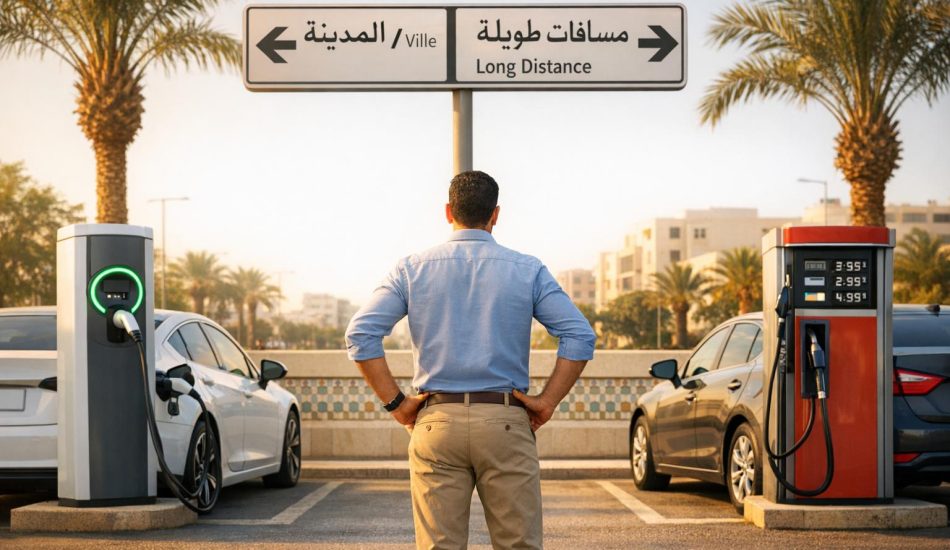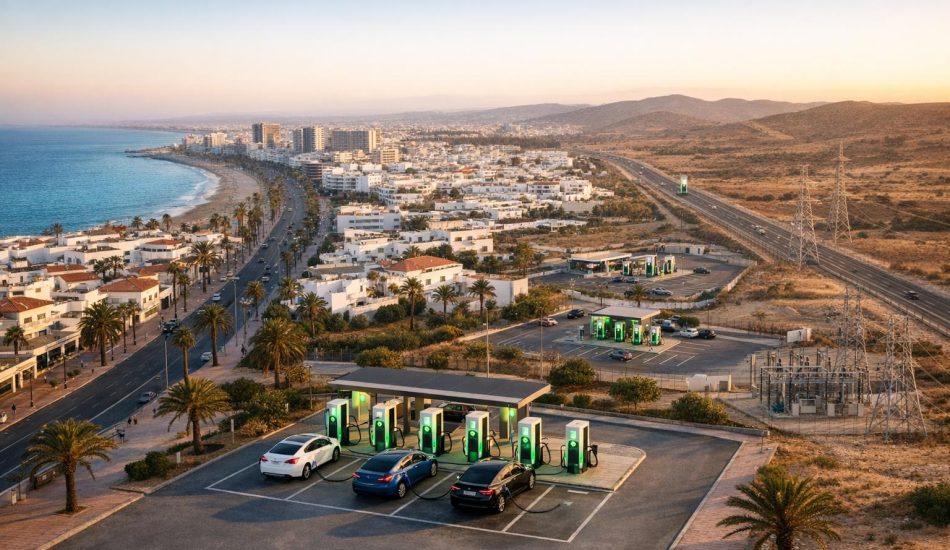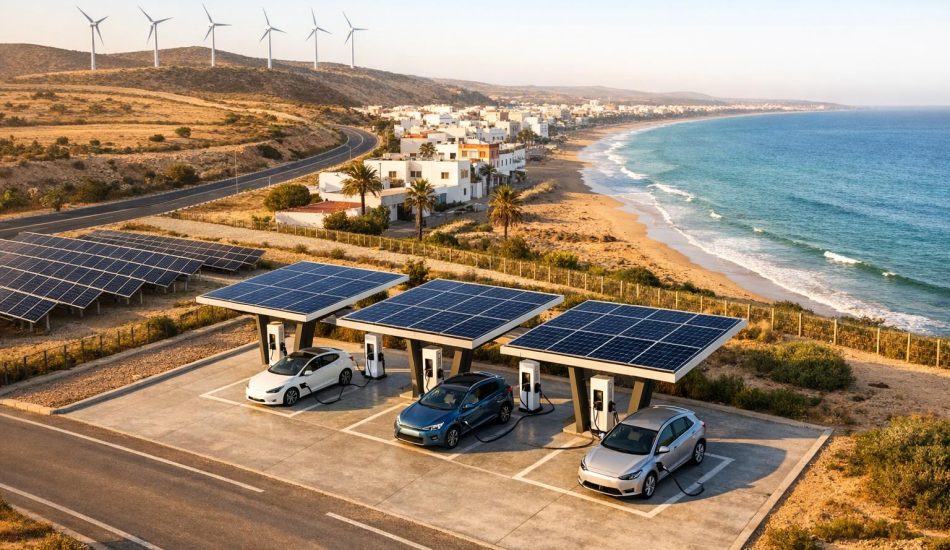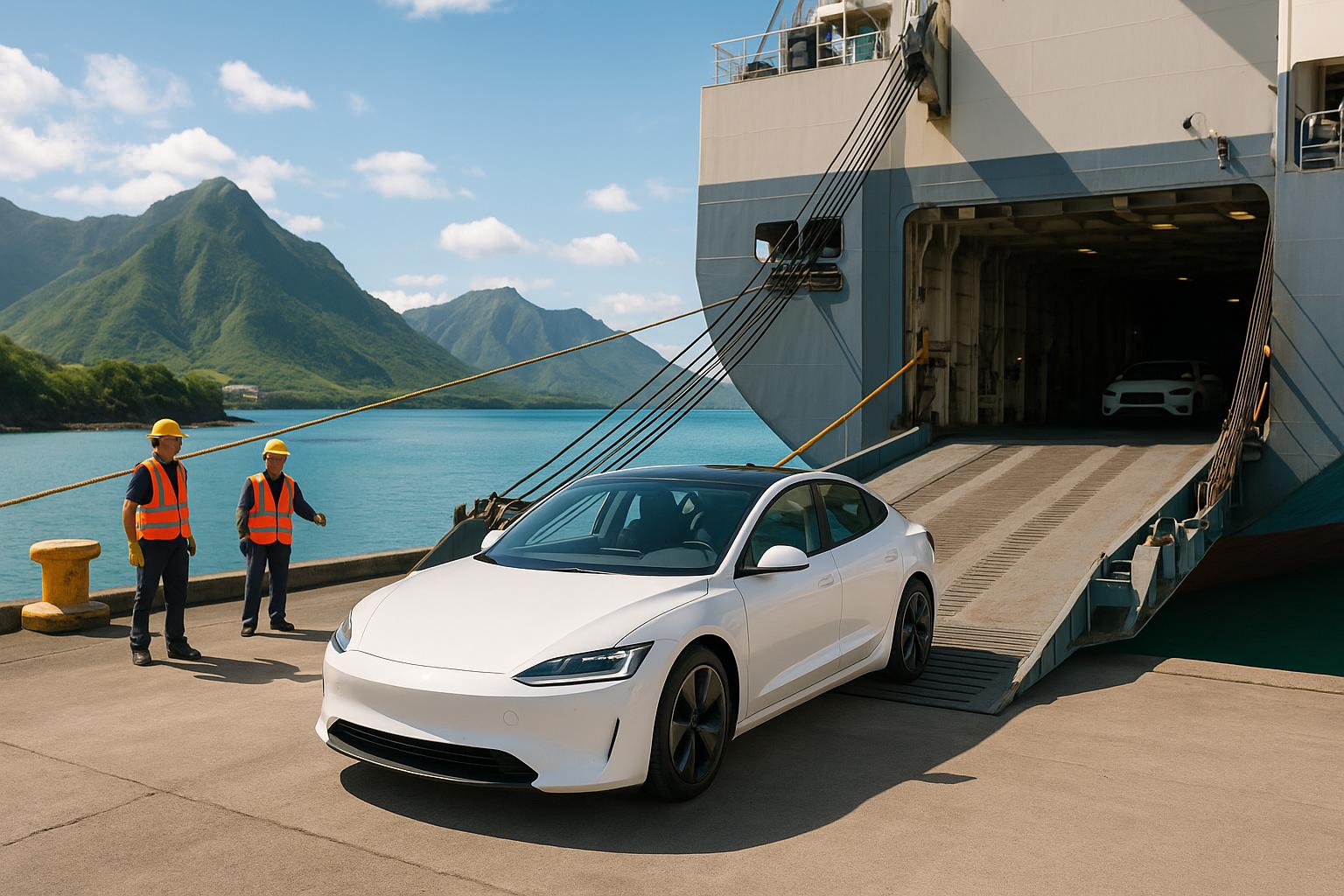
Bringing an electric vehicle (EV) into Réunion in 2025 involves navigating regulations, taxes, and logistics. Here’s what you need to know:
- Legal Requirements: Ensure compliance with French and EU rules. Key documents include a purchase invoice, bill of lading, certificate of conformity, and vehicle registration. EVs must meet EU safety, emissions, and charging standards.
- Battery Rules: Follow updated EU battery regulations, including recycling and disposal requirements. Importers must register and manage battery waste responsibly.
- Taxes and Fees: Import costs are based on the CIF value (vehicle price + shipping + insurance). Tax incentives, like a 5-year road tax exemption, can reduce ownership costs.
- Shipping: Options include container shipping (secure, costly), RoRo (cheaper, less protected), and air freight (fast, expensive). Costs range from $3,200–$6,500 with delivery times of 25–40 days.
- Local Considerations: Check charging infrastructure compatibility (Type 2/CCS2) and find certified EV service providers. Proper battery recycling is mandatory to protect the island’s ecosystem.
Tip: Platforms like EV24.africa simplify the process, offering sourcing, shipping, and compliance support tailored to Réunion’s requirements.
This guide ensures you’re prepared for a smooth EV importation experience.
The DEFINITIVE Guide to Import Your Car (Tesla EV) from USA to Portugal – TAX FREE!!!
Legal Requirements for Importing EVs into Réunion
Bringing an electric vehicle (EV) into Réunion involves adhering to both French and EU regulations. Updates to battery regulations in 2025 have added new layers to the process, so it’s crucial to stay informed.
Required Documentation
To ensure a smooth import process, you’ll need to gather several key documents:
- Purchase Invoice: This should include details like the battery capacity and charging capabilities of the EV.
- Bill of Lading: Proof of transport is necessary to confirm the shipment of the vehicle.
- Certificate of Conformity: This document verifies that your EV complies with European safety and environmental standards. It must be obtained from the manufacturer or an authorized representative. Without it, customs may deny your application.
- Approval for Import Incentives: If you’re applying for tax breaks or incentives, include documentation approved by the Minister of Investment or the Head of the Investment Coordinating Board (BKPM). Be sure to reference facility code 87 in the customs declaration.
- Vehicle Registration and Ownership Documents: Provide the original registration papers from the country of origin and proof of ownership transfer. If importing through a dealer or third party, authorization letters may also be required.
These documents are essential for meeting French and EU regulations, forming the foundation of your import application.
Vehicle Eligibility Criteria
Réunion follows EU standards for vehicle imports, so your EV must meet specific technical and safety benchmarks. These include:
- Compliance with Emissions and Safety Standards: Your EV must pass crash test certifications, meet electromagnetic compatibility requirements for charging systems, and feature labels in French.
- Technical Specifications: Vehicles need to be left-hand drive, as required by French law. If your EV doesn’t meet this criterion, modifications may be necessary.
- Battery and Charging Compatibility: Ensure the battery capacity and compatibility with European Type 2 charging connectors are clearly documented.
Additionally, your EV must comply with any age limits or other technical specifications set by local authorities. Once the vehicle meets these requirements, you’ll need to address the stringent battery regulations.
Battery and Disposal Regulations
The EU’s Battery Regulation (2023/1542) has introduced stricter rules for EV imports into Réunion, covering every stage of a battery’s lifecycle – from production to recycling.
"EU rules on batteries aim to make batteries sustainable throughout their entire life cycle – from the sourcing of materials to their collection, recycling and repurposing." – European Commission
Importers are required to register in France and take financial responsibility for battery waste management throughout the vehicle’s lifecycle. Compliance with the regulation involves meeting specific recycling and recovery targets:
- Recycling Efficiency: Lithium-based batteries must achieve a recycling efficiency of 65% by December 31, 2025.
- Material Recovery Targets: By December 31, 2027, recovery rates must reach 90% for cobalt, copper, lead, and nickel, and 50% for lithium.
Starting August 18, 2025, the Batteries Directive 2006/66/EC will be fully repealed, making the new regulation the sole standard. From this date forward, importers must adopt a clear due diligence policy for battery collection and management and communicate it publicly.
To comply, your EV must feature EU-compliant battery labeling that includes details on sustainability, safety, and end-of-life procedures. The battery passport system requires precise documentation of the battery’s composition, performance, and sustainability metrics.
These measures reflect the EU’s response to the anticipated surge in battery demand, which is expected to grow 14 times by 2030, with the EU accounting for 17% of that demand. Non-compliance can result in import rejection or hefty penalties, so careful preparation is non-negotiable.
Import Taxes, Duties, and Fees
When bringing an EV into Réunion, understanding the financial obligations is just as important as meeting the legal requirements. As a French overseas region and part of the European Union, Réunion follows EU trade policies and customs rules, which directly shape your import expenses. Once you’ve tackled the regulatory steps, it’s time to dive into the numbers. Here’s a breakdown of what to expect.
How to Calculate Taxes and Duties
Réunion uses the CIF (Cost, Insurance, and Freight) method to determine the taxable value of your shipment. This means the vehicle’s purchase price is combined with shipping, insurance, and any extra transport costs to calculate the total value. This total is then multiplied by a duty rate, which depends on the vehicle’s classification, to estimate the import taxes. Don’t forget to factor in any customs broker fees, which can add to the final amount.
To make things easier, tools like Easyship and Zonos can provide estimates for duties and taxes. It’s a good idea to research these costs ahead of time and stay informed about international trade agreements that might impact the final amount you’ll need to pay.
Available Incentives and Exemptions
Import duties aren’t the whole story – there are also potential savings to explore. As part of France, Réunion benefits from incentives aimed at boosting EV adoption. For instance, EVs, hybrid electric vehicles (HEVs), and plug-in hybrid electric vehicles (PHEVs) often qualify for exemptions from annual road taxes for the first five years after registration. However, these programs can vary across EU countries and may change over time, so double-check the latest policies before making any decisions.
On top of that, France has been ramping up support for charging infrastructure, both residential and commercial. While not all EU countries offer such incentives, France’s efforts can help reduce the overall cost of owning an EV. To take advantage of these benefits, ensure your import paperwork includes any necessary facility codes and pre-approved documents from French authorities.
Import Cost Comparison by EV Model
When calculating the total cost of importing an EV, include the purchase price, shipping, insurance, duties, and VAT. While these upfront costs can be significant, potential tax savings – like the five-year road tax exemption – can help balance things out. Costs will vary depending on the EV model, its country of origin, and the shipping route. Using trusted online calculators can give you a more accurate estimate tailored to your situation.
Keep in mind that duties and taxes must typically be paid before customs will release your vehicle. To avoid delays or unexpected charges, make sure the HS code and goods description on your commercial invoice are accurate and match the details of your shipment.
Shipping and Delivery Process
After estimating import costs and gathering the necessary documentation, the next step is arranging transportation for your electric vehicle (EV). This process requires careful planning, especially since EVs come with specific challenges, such as the safe handling of lithium-ion batteries.
Shipping Methods and Delivery Times
There are three main shipping options for transporting your EV to Réunion, each with its own advantages and trade-offs:
- Container Shipping: This method ensures your EV is placed inside a sealed container, offering excellent protection against weather and damage during transit. It’s particularly well-suited for EVs due to their sensitive battery systems. While this option is more expensive, it provides greater security.
- Roll-on/Roll-off (RoRo) Shipping: A cost-effective alternative, RoRo shipping involves driving the vehicle directly onto the ship. However, it offers less protection and may take longer due to multiple stops at various ports.
- Air Freight: The fastest shipping method, but also the most expensive. Additional regulatory compliance for hazardous materials like lithium-ion batteries contributes to the higher cost.
Shipping costs from the United States to Réunion typically range between $3,200 and $6,500, with delivery times of about 25–40 days. EV shipping tends to cost slightly more than standard vehicles, with cross-country transport within the U.S. ranging from $1,000 to $1,800 before international shipping.
Customs Clearance and Insurance
Once you’ve selected a shipping method, the focus shifts to customs clearance and securing proper insurance. Réunion follows European Union customs protocols, meaning your shipment must include specific documents for smooth processing. Here’s a quick overview of the most commonly required paperwork:
| Document | Details |
|---|---|
| Commercial Invoice | Lists the country of origin, currency values, unit value, number of units, and the HTS code. |
| Packing List | Provides a detailed inventory of the items being shipped. |
| Shipper’s Letter of Instruction (SLI) | Required for shipments exceeding $2,500 in value. |
| Verified Gross Mass (VGM) Form | Must be submitted before the documentation deadline for container shipments. |
Getting the correct HTS code for your EV is essential, as it directly impacts tax calculations and helps avoid unnecessary delays.
Insurance is another critical consideration. Standard shipping insurance may not fully cover specialized components like lithium-ion batteries. Opt for comprehensive coverage that includes battery protection and the vehicle’s full replacement value. Comparing multiple insurance quotes can help you find the best balance between cost and coverage.
Preparing for Vehicle Arrival
Once your vehicle is insured and cleared by customs, it’s time to prepare for its arrival. Start by thoroughly cleaning your EV before shipping – this makes customs inspections easier and helps document its condition. Remove all personal belongings from the vehicle to avoid customs issues and liability concerns. Secure or remove loose parts like antennas, roof racks, or mirrors to prevent damage during transit, and disable the alarm system to avoid disruptions.
For safety, charge the EV battery to 30–50% capacity before shipping, as recommended for lithium-ion batteries. Some manufacturers may have specific guidelines, so it’s a good idea to consult your owner’s manual or contact the manufacturer for advice.
Take detailed photographs of your vehicle from multiple angles, focusing on any existing damage. These images can be crucial if you need to file an insurance claim later. Have spare keys ready for the shipping company, and ensure all title and registration documents are in order. Keep digital copies of all paperwork stored securely.
Finally, plan for potential delays. Factors like weather, port congestion, or customs processing can extend delivery times beyond the initial estimates. Building flexibility into your schedule can help you navigate any unexpected challenges.
sbb-itb-99e19e3
EV-Specific Considerations in Réunion
Once your electric vehicle (EV) arrives on the island, it’s essential to adapt to the local infrastructure and regulations to ensure everything runs smoothly. From charging options to maintenance and recycling, there are several factors to consider for a hassle-free experience.
Charging Infrastructure and Compatibility
Before your EV even lands in Réunion, it’s a good idea to evaluate the island’s charging infrastructure. This step is crucial for ensuring your EV functions without hiccups. Public charging stations play a key role, especially for those who can’t charge at home. Many urban areas offer both AC and DC fast charging, which can be convenient, but for day-to-day use, a Level 2 home charger is often the most practical solution.
When choosing a charging setup, consider factors like charging speed, ease of use, reliability, pricing transparency, and whether the system is compatible across different brands. Make sure your EV’s charging port aligns with European standards, such as Type 2 connectors or the CCS2 system, which are commonly used in Réunion.
If you decide to install a Level 2 home charger (240V), it can fully recharge most EVs overnight. However, it’s important to hire certified EV electricians to ensure your home’s electrical system can handle the additional demand safely. Once your charging setup is sorted, having access to reliable local support for maintenance will be your next priority.
Local Maintenance and Support
Keeping your EV in top condition on the island requires finding qualified service providers. Since EVs rely on advanced technology, not all mechanics are equipped to handle them. Research authorized service centers for your specific EV brand and confirm that their technicians are certified to work on electric vehicles.
For any specialized repairs, it’s essential to use certified professionals and genuine parts. Routine checkups should include battery health assessments, inspections of braking and cooling systems, and software updates. These steps ensure your EV stays efficient and safe.
The tropical climate in Réunion introduces its own set of challenges. High humidity and salt air can affect electrical components, so it’s critical to work with service providers who understand these conditions. Simple maintenance tasks, like monitoring tire pressure and replenishing windshield washer fluid, are just as important to keep your EV running smoothly.
Battery Recycling and Disposal
Réunion follows strict EU recycling standards for battery disposal, ensuring sustainability and environmental protection. The EU Battery Regulation (2023/1542) applies here, setting clear rules for recycling and disposal. This regulation aims to create a circular economy by cutting waste and requiring recycled materials in new batteries starting in 2031. It also includes ambitious recycling efficiency targets.
To safely store used batteries, keep them in a cool, dry, non-conductive container and protect the terminals from damage. Proper disposal isn’t just about following regulations – it’s about conserving resources and protecting the environment.
"Understanding the why, how, and where makes a significant difference for safety, resource conservation, and meeting regulations. It’s about acting responsibly with the power sources we rely on daily." – Chris, Author, ROYPOW
Since local requirements for battery recycling can vary, always check the specific guidelines in Réunion. Proper disposal is especially important here to safeguard the island’s ecosystem and support broader sustainability efforts. By taking these steps, you can ensure your EV journey aligns with both local and global environmental goals.
Using EV24.africa for Sourcing and Import Support
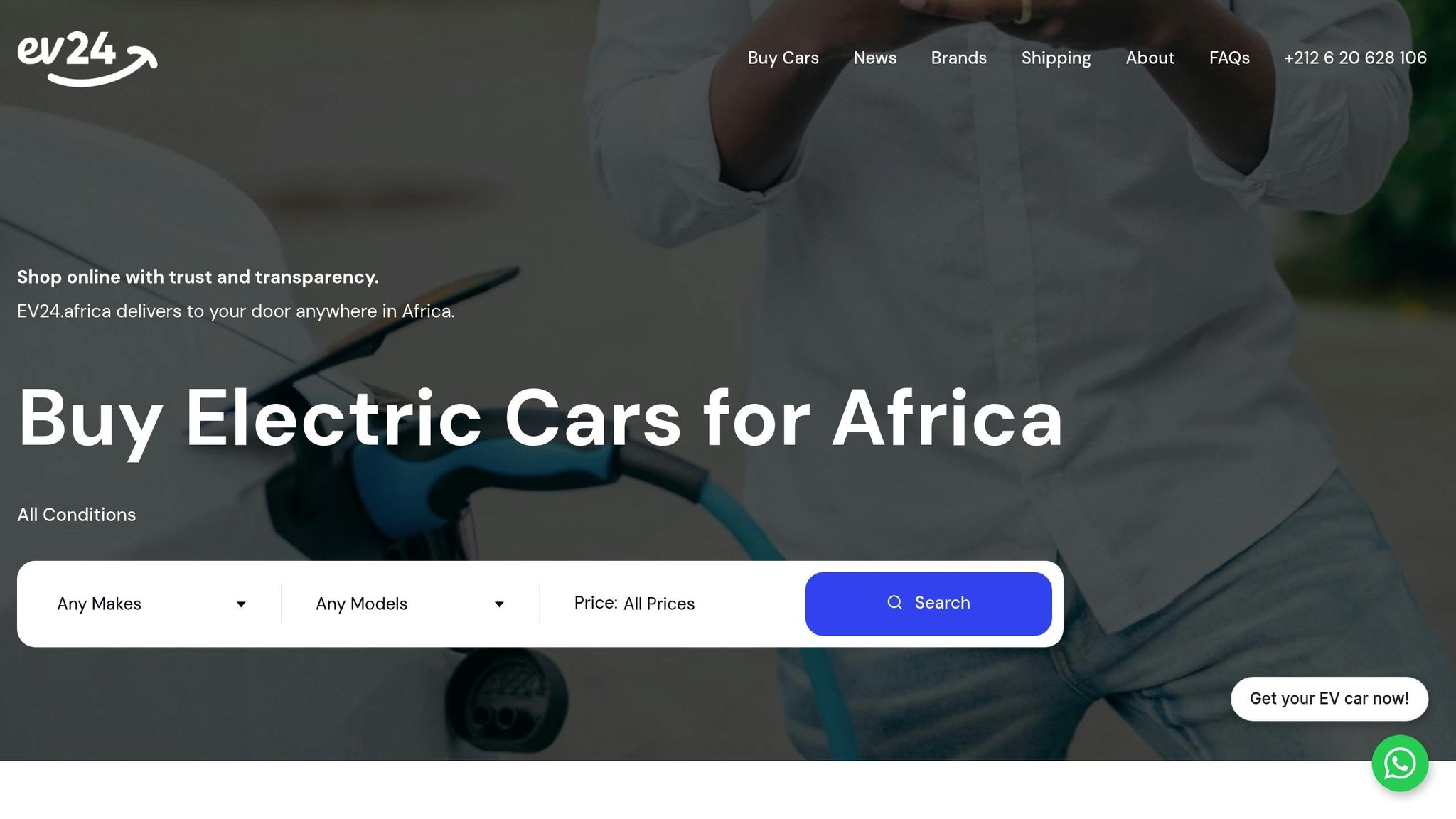
EV24.africa simplifies the process of sourcing and importing electric vehicles (EVs) to Réunion, offering full support from start to finish. Known for its extensive reach, the platform has successfully delivered EVs to all 54 African countries, with completed deliveries in ten nations already. By tackling the legal, logistical, and technical hurdles involved in EV imports, EV24.africa ensures a smoother experience for buyers.
Finding and Selecting EVs
The EV24.africa marketplace features over 200 EV models from 50+ global manufacturers, including both new and certified pre-owned options with warranties. Major brands like Tesla, BYD, Volkswagen, Mercedes-Benz, and XPeng are available, providing options to suit different budgets and needs. The platform allows users to filter vehicles by budget, charging compatibility, or intended use. Detailed listings with competitive pricing and clear specifications make it easier to make informed decisions. For used EVs, the inclusion of battery health reports is particularly helpful, especially for an island environment like Réunion. With over 350 verified vehicle requests from 30+ countries, EV24.africa ensures quality and reliability through a rigorous verification process, reducing potential import complications.
Financing and Delivery Services
One of the standout features of EV24.africa is its transparent pricing. Buyers receive real-time price breakdowns, including taxes, so there are no hidden costs. This level of clarity helps avoid surprises during the import process.
"At EV24.africa, we simplify the process of importing and buying electric vehicles in Africa. Our expertise ensures a seamless, transparent, and stress-free experience, so you can focus on driving the future of mobility."
Flexible financing options are available through partnerships with banks, making EVs more accessible for buyers who may not be able to pay the full amount upfront. EV24.africa also handles the entire logistics chain, covering shipping, customs clearance, and local registration to meet Réunion’s specific requirements. Buyers can track their vehicle’s journey in real time, offering added peace of mind.
EV Brand Comparison for Réunion
EV24.africa goes beyond logistics by providing tools to compare leading EV brands like Tesla, BYD, Volkswagen, Mercedes-Benz, and XPeng. These comparisons are tailored to Réunion’s unique driving conditions and infrastructure, helping buyers choose the right model for their needs. The platform also provides additional services, such as warranty coverage, spare parts access, and solutions for off-grid or rural areas. With country-specific expertise, EV24.africa offers accurate pricing and tax calculations for Réunion, ensuring buyers can confidently plan their purchase.
Conclusion
Bringing an electric vehicle (EV) into Réunion involves a few critical steps: ensuring the vehicle meets eligibility requirements, gathering the necessary paperwork (like battery disposal certifications), calculating applicable taxes and duties, and navigating customs clearance.
It’s also important to think beyond the import process and consider the overall costs of owning an EV. Factors like charging infrastructure compatibility, access to local maintenance services, and proper battery recycling options all play a role in determining how practical and worthwhile the investment will be.
With regulations constantly shifting, staying up to date is essential. Changes in policies and incentives can significantly influence the demand for EVs and the overall cost of ownership. This evolving landscape means individual importers must remain vigilant about updates to rules and incentives specific to Réunion.
For a smoother experience, working with seasoned import specialists can make all the difference. Companies like EV24.africa offer services that cover sourcing, customs clearance, and local registration, all while providing transparent pricing and ensuring compliance with Réunion’s specific requirements.
FAQs
What are the battery recycling rules for importing an EV to Réunion in 2025?
In 2025, bringing an EV into Réunion means adhering to EU battery recycling regulations. These regulations require EV batteries to provide information about their carbon footprint and meet defined recycling efficiency benchmarks. Some of these rules are set to kick in starting February 2025. Importers will need to have all the necessary paperwork in place, covering aspects like waste management, recycled material content, and due diligence protocols.
Although Réunion aligns with EU standards, there may be local variations in the guidelines. Staying informed about any additional, island-specific requirements is crucial when preparing to import an EV.
What are the shipping options for importing an EV to Réunion, and how do they compare in cost, protection, and delivery time?
Shipping an electric vehicle (EV) to Réunion comes with two primary choices: sea freight or air freight. The cost typically falls between $3,200 and $6,500, depending on the shipping method and any additional services you might need.
- Sea freight: If you’re looking to save on costs, this is the way to go. Delivery usually takes 3 to 5 weeks, and your EV is shipped in enclosed containers, offering protection from weather and potential transit damage.
- Air freight: Need your EV delivered quickly? Air freight can get it to Réunion in just 5 to 14 days, but it comes with a higher price tag. This option is best suited for high-value vehicles or when time is of the essence.
Your choice will ultimately depend on how much you’re willing to spend, how quickly you need your EV, and the level of care you want during transportation.
What tax incentives and exemptions are available for EVs in Réunion, and how do they affect ownership costs?
Réunion provides a range of tax breaks and exemptions aimed at making electric vehicle (EV) ownership easier on the wallet. These perks include transferable tax credits and exemptions from sales taxes, which can help cut down the initial purchase price and even trim long-term expenses.
These incentives not only make EVs more affordable but also support the shift toward cleaner transportation. They’re crafted to encourage more people and businesses to choose EVs, offering a win-win for both the environment and your budget.


